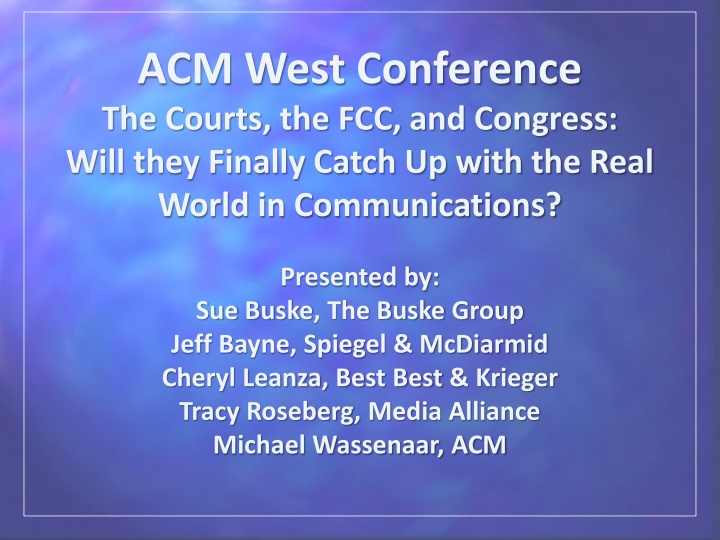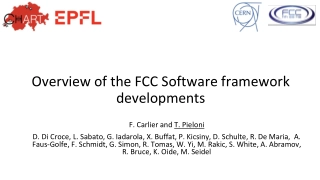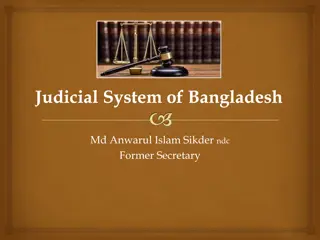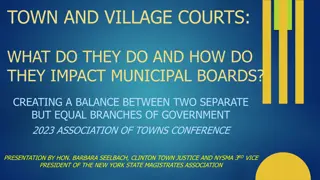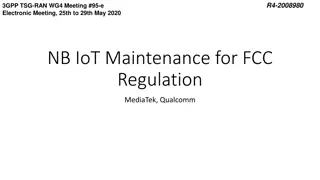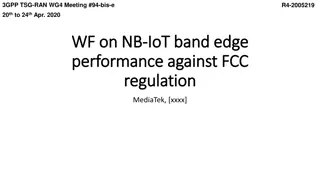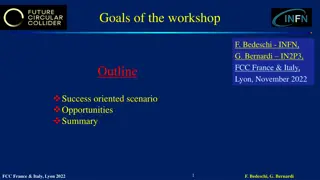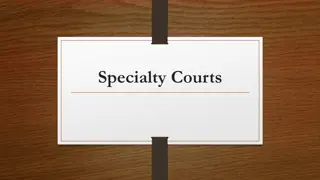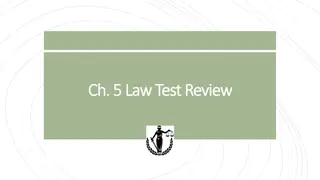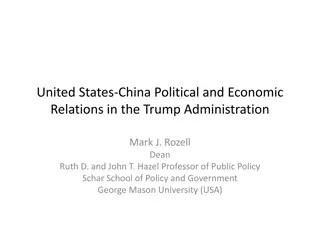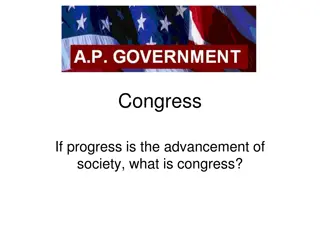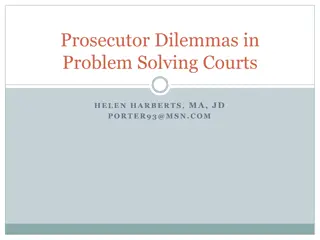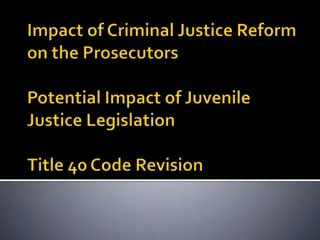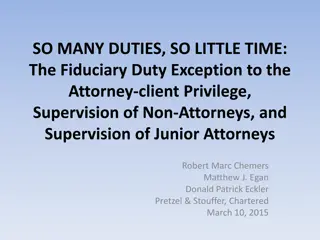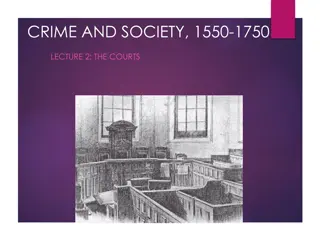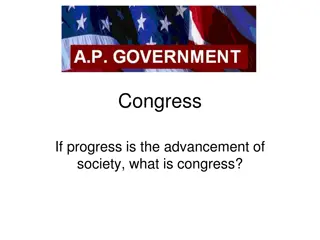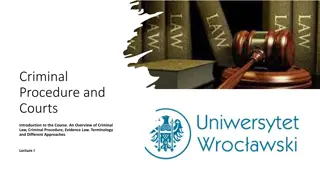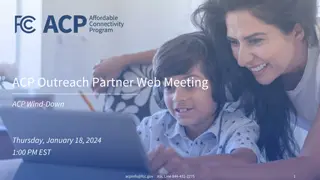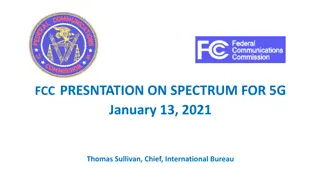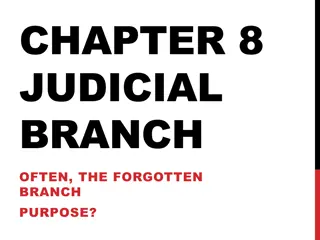Catching Up in Communications: The Courts, FCC, and Congress
Explore the City of Eugene v. FCC case in the Sixth Circuit and its implications on non-monetary franchise requirements in the communications industry. Key topics include Fair Market Value, preemption of state requirements, and the FCC's Mixed-Use Rule. Discover the aftermath of the ruling, appeals, and forecast for future FCC actions.
Download Presentation

Please find below an Image/Link to download the presentation.
The content on the website is provided AS IS for your information and personal use only. It may not be sold, licensed, or shared on other websites without obtaining consent from the author.If you encounter any issues during the download, it is possible that the publisher has removed the file from their server.
You are allowed to download the files provided on this website for personal or commercial use, subject to the condition that they are used lawfully. All files are the property of their respective owners.
The content on the website is provided AS IS for your information and personal use only. It may not be sold, licensed, or shared on other websites without obtaining consent from the author.
E N D
Presentation Transcript
ACM West Conference The Courts, the FCC, and Congress: Will they Finally Catch Up with the Real World in Communications? Presented by: Sue Buske, The Buske Group Jeff Bayne, Spiegel & McDiarmid Cheryl Leanza, Best Best & Krieger Tracy Roseberg, Media Alliance Michael Wassenaar, ACM
City of Eugene v. FCC (Sixth Circuit 2021) August 2019: FCC issues Third Report & Order on Section 621(a)(1) of the Cable Act Cable-related, non-monetary franchise requirements count towards franchise fee cap $$$ $$$ $$$ $$$ SPIEGEL & MCDIARMID LLP
City of Eugene v. FCC (Sixth Circuit 2021) How to value these non-monetary requirements? Fair Market Value Mixed-Use Rule Franchising authorities can t regulate non-cable services except as expressly permitted in the Cable Act Preemption of Other State & Local Requirements State and local governments can t impose fees or requirements on non-cable services provided over a cable system SPIEGEL & MCDIARMID LLP
City of Eugene v. FCC (Sixth Circuit 2021) ACM, local governments, and others appeal Sixth Circuit: Upholds FCC s ruling that cable-related, non-monetary franchise requirements count towards 5% Franchise Fee cap BUT reverses FCC on how to calculate their value Fair Market Value Operator s marginal cost FCC s Mixed-Use Rule only gets in the way, but upholds the FCC s preemption ruling SPIEGEL & MCDIARMID LLP
City of Eugene v. FCC (Sixth Circuit 2021) Rehearing denied; Supreme Court doesn t take case What happens next? Implementation issues Changes to Cable Act? Future FCC action? SPIEGEL & MCDIARMID LLP
FCC Forecast When will we get a 5th Commissioner? Gigi Sohn, public interest advocate Committee tie vote Awaiting 50 senators on the floor Window for the Biden FCC agenda is shrinking every week
FCC: Infrastructure Investment and Jobs Act Affordable Connectivity Program (eff 4/15/22) ACP outreach grants coming (replies 4/15/22) Universal Service report (deadline 8/12/22) Broadband nutrition label (deadline 11/15/22) Broadband Deployment Maps (target 1/23) Digital nondiscrimination (deadline 11/15/23) Comments due 5/16 and 6/30 Echoes Cable Act anti-redlining rule
Rosenworcel FCC beyond IIJA: So much to do, so little time Public safety, national security, robocalls Digital divide homework gap, universal service Reclassification of Broadband as Title 2 and Net Neutrality 5G deployment Media ownership rules, EEO data, prison phone justice . . . . . Cable franchising rules follow up to the 621 litigation
Grant funding: NTIA & States State Digital Equity Plans Planning Grant Program ($60 M) rules in formulation now NTIA will approve plans which will govern the State Digital Equity Capacity Grant Program ($1.44 B) Digital Equity Competitive Grant Program $1.25 B discretionary grant program distributed vial annual grant programs over 5 years. Non- profits eligible. Timing TBD. Monitor: https://broadbandusa.ntia.doc.gov/
What else is hot in federal telecom policy? Applying the new anti-trust to big tech Disinformation & misinformation Russia, elections Section 230 Privacy reform Loss of local news and journalism FCC auction authority renewal, spectrum management
Protecting Community Television Act Introduced by Sen. Markey (MA) and Rep. Eshoo (CA) in 2020 in response to the PEG provisions in the FCC s Third Report and Order on Cable Franchising. Does not address other issues. 2022 bill is not changed only has Rep. DeFazio and Sen. Baldwin identified as lead sponsors. The bill specifies that franchise fees are monetary thus eliminating the In-Kind assessment process set up by the FCC s rules.
Protecting Community Television Act Odds of passage are better this session due to the balance of power in Congress. While community television services are non-partisan in nature, getting bi-partisan support has been difficult (as has been the case with past Congressional efforts).
Protecting Community Television Act HR 6219 has 35 co-sponsors in the House: CA: Huffman, Takano, Chu, Lieu, Costa, Matsui, Schiff, Panetta Carbajal HI: Kahele, Case OR: DeFazio, Blumenauer We have added 15 through advocacy since Feb 1 and would like to be at 50 by Memorial Day.
Protecting Community Television Act S 3361 has 15 co-sponsors in the Senate: CA: Feinstein HI: Hirono OR: Widen, Merkley
Protecting Community Television Act ACM is coordinating visits with DC Congressional staff on the bill. Have coordinated 70 visits this year. We are working with other associations, member organizations, non-members and government relations staff. Contact me if you are interested in helping the campaign. We are coordinating with House and Senate leads on strategy.
Technology in transition the move from cable to broadband Declining services called cable, declining franchise fees what is the public interest trade-off for broadband?? Cities are suing attempting to recover funds from Netflix and Hulu. Outcome cloudy. Depends on the wording of state law, the courts.
OTT status in states in ACM West City of Reno v. Netflix pending appeal in federal court, 9th Circuit City of Lancaster, CA v. Netflix and Hulu, pending appeal in state court 33 of 45 states include streaming services in their general sales tax Including AZ, CO (new-2021), HI, NM NOT: CA, NV
NCTA v. Frey (First Circuit 2021) 2019: Maine enacts An Act to Ensure Nondiscriminatory Treatment of Public, Educational and Government Access Channels by Cable Operators Within the last several years, cable operators began taking steps that made it more difficult to find and watch PEG channels. So ME adopts: Basic Tier Provision Anti-Channel Slamming Provision PEG HD Provision provisions Electronic Programming Guide Provision SPIEGEL & MCDIARMID Line Extension Provision LLP
NCTA v. Frey (First Circuit 2021) Cable Operators (NCTA) sue in federal court Claims ME Law violates federal Cable Act Claims PEG provisions violate First Amendment District Court rules for ME ME law provisions are consumer protection allowed under Cable Act unless specifically preempted None of the PEG provisions are specifically preempted NCTA failed to show infringement on cable operators First Amendment rights SPIEGEL & MCDIARMID LLP
NCTA v. Frey (First Circuit 2021) NCTA appeals (not First Amendment claim) Court asks for FCC s view; FCC declines First Circuit upholds Maine Law Even if not consumer protection, PEG provisions don t violate Cable Act s more general inconsistent with standard Rejects NCTA s facial challenge to Line Extension provision, but it could be challenged in particular franchise renewals SPIEGEL & MCDIARMID LLP
NCTA v. Frey (First Circuit 2021) What happens next? Implementation issues in ME First Circuit ruling binding in ME, MA, NH, PR, and RI Similar action in other states? State law Franchise requirements Future focus on consumer protection ? SPIEGEL & MCDIARMID LLP
Digital Infrastructure and Video Competition Act What is DIVCA and what does it do? Digital Infrastructure and Video Competition Act (DIVCA) passed in 2006 Eliminated local franchising and permitted the CPUC to grant cable franchises with almost automatic renewals Established a one-size-fits-all approach With one minor exception, DIVCA has not been updated since 2006 Result: California has fallen behind in a myriad of issues (e.g., consumer protection, technology upgrades, monitoring build-out, compensation for use of PROW)
California: Changes to DIVCA SB 28: Passed in 2021 CPUC will collect granular data on actual locations served by franchise holders CPUC will adopt customer service rules Gov. Newson stated in signing letter that DIVCA was out of date and wanted to see significantly more changes AB2635: Assemblyman Levine introduced Requires transmission of PEG signals in HD AB 2748: Assemblyman Holden introduced Modest amendments for now, focusing on redlining, consumer protection, authority of CPUC
Assembly Bill 2748 AB 2748 makes changes to DIVCA, including: Gives CPUC the complete authority as permitted under federal law of a franchising authority Establishes the ability of the CPUC to undertake closer scrutiny at franchise renewal Allows CPUC to review service quality and redlining complaints prior to renewing franchises Eliminates build out standards that are completely antiquated Changes are likely to be coming forward from public interest, local government, and digital inclusion entities
Assembly Bill 2635 AB 2635 makes a small change to DIVCA that will provide a major benefit to the public and CMC s Cable operator shall not degrade the PEG signal to a lower transmission standard before airing on cable system If content is created in HD, bill requires PEG channels to be delivered to consumers in HD or the same technology used by local broadcast TV channels AB 2635 requires equitable treatment of PEG channels AB 2635 does not increase costs to consumers
Cable Industry Arguments Against AB 2635 CCTA: Mandating the duplicative retransmission of PEG channels is not only costly, but ill-advised now when network bandwidth use is at an all-time high and rising. FACTS: The Comcast cable channel lineup in Sacramento includes hundreds of channels. Over 160 program services are carried in both HD and standard definition, including many home shopping channels, 25 sports channels, and 30 premium channels like HBO and Showtime. How does the industry justify such costly duplicative retransmission and network bandwidth for all of these channels?
Cable Industry Arguments Against AB 2635 CCTA: Is it good public policy to tie-up bandwidth for duplicate channels with limited viewership and at the expense of distance learning, remote work, or telemedicine? FACTS: The concept of limited viewership is no longer relevant in an era of nearly 1,000 cable channels. With hundreds of channels to choose from, every channel has limited viewership. CCTA: Converting PEG channels to an HD format would be extremely costly because it would require new equipment and fiber connections between the PEG provider and a cable headend facility. FACTS: PEG channel facilities converted to HD years ago, and have been delivering HD signals to cable companies throughout California. In many communities all of connectivity and/or encoders/decoders are already in place. It s just a minor software reconfiguration.
Cable Industry Arguments Against AB 2635 CCTA: These additional costs get borne by all customers even if they do not watch any PEG channels. FACTS: Hundreds of cable channels are never watched by customers, but they must pay the costs for cable companies to carry them (including very high-priced services like ESPN and regional sports channels). There are NO additional subscriber costs for HD carriage of PEG channels CCTA: AB 2635 would upgrade and provide duplicative PEG channels for little, if any, public benefit. FACTS: Especially during the COVID pandemic, PEG channel managers have adapted to provide ways for local governments to communicate with citizens, and maintained mechanisms to allow residents to see and provide testimony to elected officials at city council, schools board, and other public meetings a major public benefit.
